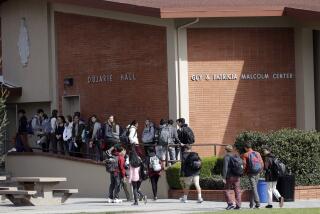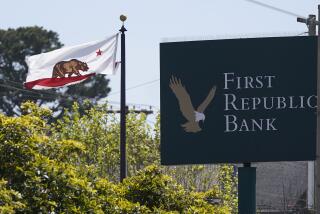Former IndyMac execs told to pay FDIC $169 million
- Share via
Three former IndyMac Bank executives must pay the government $169 million for their role in the Pasadena lender’s collapse, delivering a victory to the Federal Deposit Insurance Corp. in its efforts to recover losses from the financial crisis.
In verdicts delivered Friday, jurors in federal court in Los Angeles agreed with the government’s claim that the executives, who ran a construction-lending division at IndyMac, had been negligent in approving 23 loans to developers and homebuilders who never repaid them.
Lawyers for the FDIC had argued that the executives — Scott Van Dellen, Richard Koon and Kenneth Shellem — violated bank safety standards in their eagerness to reap bonuses for generating higher volumes of the development and construction loans.
“The jurors gave us everything we asked for,” said Thomas D. Long, an attorney from the outside law firm, Nossaman LLP, that represented the FDIC. “We are proud of and grateful to the jury for holding the bankers accountable and issuing the right judgment in a very important case related to the nation’s financial crisis.”
The FDIC and defense attorney Damian Martinez did not immediately respond to requests for comment. Martinez had argued that the defendants could not have foreseen the huge downturn in the housing market that punished IndyMac and other mortgage and construction lenders.
While not the largest bank to fail in recent years, IndyMac was the costliest to the nation’s deposit insurance fund, with a loss of $13 billion. Socked by enormous losses, especially on home loans made with little verification of borrowers’ incomes, it failed after a run on its deposits in 2008.
The FDIC victory contrasts with mixed results obtained by the Securities and Exchange Commission in its pursuit of damages against financial executives accused of contributing to the financial crisis.
In one setback involving wide-ranging civil fraud claims against former IndyMac Chairman Michael Perry, a federal judge in Los Angeles tossed out nearly the entire SEC lawsuit. Perry settled the single remaining negligence claim in October for $80,000.
“The contrast is striking,” said John C. Coffee, a Columbia law school expert in fraud claims, contending that the SEC’s own legal staff is weak. “If you want a large recovery, you need a private law firm that can staff the case with the bodies that it takes.”
The FDIC lawsuit, filed in July 2010, went to trial in mid-November. It was the first of 39 suits the FDIC has filed against 308 insiders at banks that have failed in the five years since the subprime mortgage meltdown triggered the Great Recession.
The agency has settled before trial with some bank officers and directors.
Those include a settlement of up to $64 million with directors and officers of Washington Mutual Bank, the giant Seattle savings and loan whose collapse in 2008 was by far the biggest bank failure in U.S. history, and another $125 million settlement with the parent company, Washington Mutual Inc.
An FDIC lawsuit blaming Perry for the thrift’s collapse is pending. A spokesman for the agency said the FDIC made a previously undisclosed settlement of $1.4 million with Richard Wohl, IndyMac’s former president, most of it paid by officers and directors insurance.
It was unclear how much of the award Friday would be paid. The FDIC had hoped to recover funds from $80 million in insurance policies covering civil wrongdoing by IndyMac officers and directors, but another federal judge has ruled that insurance can’t be tapped in this case. The FDIC has appealed that ruling.
More to Read
Inside the business of entertainment
The Wide Shot brings you news, analysis and insights on everything from streaming wars to production — and what it all means for the future.
You may occasionally receive promotional content from the Los Angeles Times.








